Years from now, physicians may be able to determine whether you’re at increased risk for colon cancer by drawing blood from the tip of your finger.
Emory University researchers are working to identify biomarkers to detect a person’s chances of developing colon cancer. Much like blood pressure and cholesterol tests can indicate heart disease risk, researchers here hope that some day the makeup of blood and urine will be able to tell who’s at risk for colorectal cancer, why they may be at risk and what they can do to reduce their risk.

For now, the Emory study team is analyzing the rectal tissue samples of people with colon adenomatous polyps, non-cancerous growths considered precursors to colon cancer, and comparing them to rectal tissue samples from people who don’t have polyps. They’re also looking at whether the differences they detect in rectal tissue can also be found in blood or urine. Currently, no accepted tests exist to determine whether someone may be at risk for colon cancer.
“Most people would rather provide a blood or urine sample than get a rectal biopsy,” says Robin Bostick, MD, MPH, Rollins School of Public Health epidemiology professor and study principal investigator. Bostick is also a clinical faculty member at the Winship Cancer Institute at Emory and a Georgia Cancer Coalition Distinguished Cancer Scholar.
“In the future, biomarkers may motivate more people to change their diets and other health habits and to get screened for colon cancer as well as get colonoscopy procedure,” he says.
Though the benefits of early detection in preventing colorectal cancer deaths are well known – a 90 percent or higher cure rate when found early – an estimated 41.8 million Americans aged 50 and older at average risk for colon cancer haven’t been screened according to national guidelines, a recent study by the U.S. Centers for Disease Control and Prevention (CDC) found.
If you are 50 or older, it is highly recommended to undergo colonoscopy procedure to detect the risk of colorectal cancer.
Dr. Bostick and his team are also part of a 10-year multi-site U.S. study examining whether increased consumption of vitamin D and calcium reduce risk for colon cancer and prevent the recurrence of adenomatous polyps. About 30 percent to 40 percent of the adult population will develop these benign tumor growths, which can eventually develop into colon cancer. Removing polyps reduces cancer risk, but at least half of all people get recurring polyps five years after removal.
Read more about Dr. Bostick’s efforts to develop a colon cancer biomarker test in Public Health magazine.


One Response to Hold out your finger: Epidemiologist developing test for colon cancer risk